
Christophe Bourseiller
Nascimento : 1957-09-27, Paris, France
História
Christophe Bourseiller (born Christophe Gintzburger; born 27 September 1957 in Paris) is a French actor, writer, freemason and journalist. He began as a child actor and starred in Yves Robert's War of the Buttons (La Guerre des boutons) in 1962 on his debut. He made several appearances on stage in the late 1970s and early 1980s and again in 2005 and 2006.
He was born as Christophe Gintzburger. His father, André Gintzburger called Kinsbourg (1923-2013), was a playwright and theater producer. His mother, Chantal Darget (née Marie Chantal Chauvet) (1934-1988), was an actress and the daughter of journalist Claude Darget. His mother subsequently married the director Antoine Bourseiller (of which Christophe adopts the surname as a stage name) and they had a daughter, the rejoneadora Marie Sara.
From the age of four, he appears in cinemas in War of the Buttons, the film by Yves Robert. He then played under the direction of Jean-Luc Godard, Claude Lelouch, Jacques Demy and Pierre Jolivet. It is found in the credits of about thirty films, about twenty telefilms and on the poster of several plays.
At the same time, he pursues a career as a writer, journalist, radio and television man. He has published thirty books on topics as diverse as: minority movements, political extremism, the against-culture, the industrial music and the new wave of the 1980s.
Nearly a time of milieux of extreme left, it dedicates, in 1996, a work to the French Maoists entitled The Maoists: The Folle History of the French Red Guards.
On the radio, he began by creating in 1981 the free radio Frequency arts and shows. On France Musique, he co-produced a weekly program, launched in 2005 and dedicated to avant-garde music: Electromania and animated the morning for two seasons from 2011 to 2013. On television, after having presented several programs since 1984, he becomes editorial advisor of the program Ce soir (ou jamais!) until July 2011. He also participates in a historic program L'Ombre d'un Doubt on FR3 on Wednesdays on two, hosted by the presenter Franck Ferrand.
In 2001, he published a review of studies on the Situationist International, Éditions Denoël, Archives and Situationist Documents, five issues of which will appear until 2005. In 2009, he was behind the "Who Are You?" by Bourin Éditeur.
Since 2003, he has taught at the Institut d'Etudes Politiques in Paris and at Sciences Po Lille. He is also preparing a PhD thesis at the Paris-1 Panthéon-Sorbonne University on Les Mouvements collaborationnistes français from June 1944 to December 1950 under the direction of Pascal Ory.
Since childhood, Christophe Bourseiller has been collecting leaflets and propaganda documents. He entrusted thousands to the Institute of Social History in Amsterdam. He also collects, among others, rare and newspapers.
In 2014, he participated in the second season of the program Les Pieds dans le plat on Europe 1 as a columnist. Since September 7, 2014, he also produces on Musique Musique the program Musicus Politicus, which deals with the links between music and politics. He is finally chronicler in La Bande originale, on France Inter.
Source: Article "Christophe Bourseiller" from Wikipedia in English, licensed under CC-BY-SA 3.0.
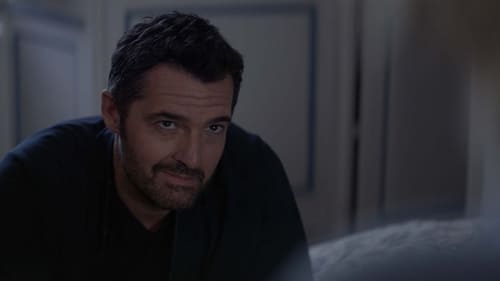
Docteur Jais
A football coach afraid of commitment has to take care of his nephew with Asperger's Syndrome.

Hurtado
A young woman is searching, today, in Paris, the collection of paintings stolen from her Jewish family during WWII.

Benjamin Lacombe
Uma professora de piano suspeita que alguém do seu meio seja responsável pelo desaparecimento de uma ex-aluna que ela hospedava. Desconfiada, ela se põe a observar o comportamento de todos.

Le curé
Após o fracasso de seu casamento, o escritor Marc Marronnier (Gaspard Proust) fica desacreditado do amor, achando que o tempo só prejudica os relacionamentos. Ele então, decide escrever um livro sobre o tema que torna-se um grande sucesso. Mas, ao se relacionar com outra mulher (Louise Bourgoin), Marc começa a questionar suas crenças.

Vergnaud
A film that relates the trial in Bordeaux in January 1953 of some of the participants in the Oradour-sur-Glane massacre of June 10, 1944.

Maurice David
Inspired by a story, that of a woman who, in the 1940s, organized a commando operation on Boulevard des Hirondelles to get her lover out of prison.

Le producteur
Elle (Isabelle Gélinas) wants to make a film about African wildlife. Adrien (Eric Métayer) is obsessed with the idea of making love to Elle in a very peculiar and theatrical imaginary bedroom. Perhaps following a principle of sympathetic magic, he arranges for a crew of eccentric friends to help create the bedroom of his dreams. If one part of his dream comes true, perhaps the other one will.

Fabien
A young man, a researcher in ancient languages, begins to receive strange radio messages in a language only he knows. The messages ask him for very bizarre missions. Eventually, he understands that he's just a pawn in an intergalactic game, and that the fate of Earth depends on him.
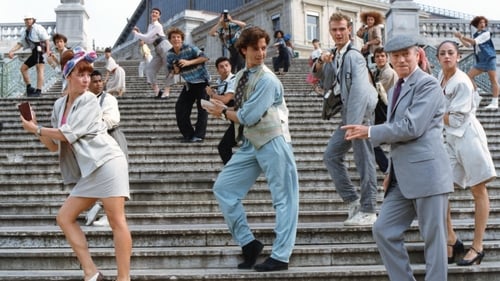
Serge
In a charming mixture of fantasy and reality, this film recalls the great musicals of Hollywood's Golden Age. Yves Montand, playing himself, returns to his hometown of Marseilles to appear in an autobiographical musical. Once there, he searches for the barmaid he once loved and also encounters young hopeful Marion, giving her the chance of a lifetime
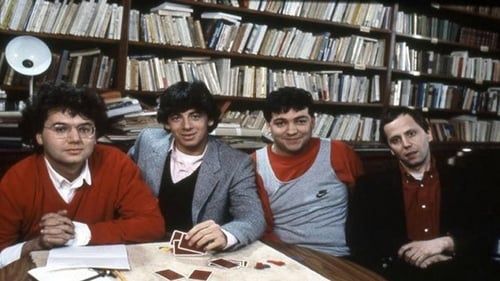
Francis
A clique of four young teachers at a high school looks critically at their colleagues. To avoid falling in the same routine, they bring new ideas into the school lessons and play little games and pranks in their spare time -- sometimes get even more childish than their pupils. When they get opposition from the other teachers, they play tricks to get rid of them.

Edgar
A young woman, employed in a jewelry store, decides to take advantage of the heist she witnesses. She shoots down one of the burglars; the other will pursue her.
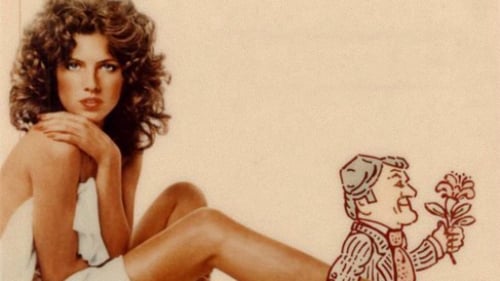
Jean-Philippe Loriol
A bank clerk is given an unusual retirement gift, a high class call girl. Unaware that he has been 'set up' by colleagues the man goes with the girl to Venice where he enjoys his new found virility.
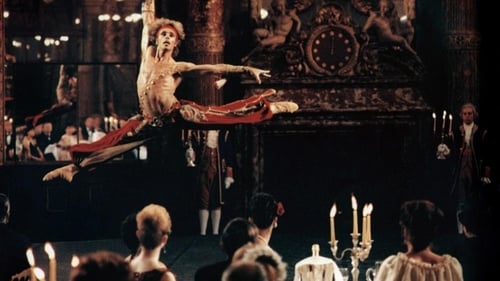
O filme acompanha quatro famílias, de diferentes nacionalidades (francesa, alemã, russa e americana), mas com a mesma paixão pela música, das décadas de 1930 a 1960. As várias linhas da história se cruzam repetidamente em diferentes lugares e épocas, com suas próprias partituras temáticas que evoluem com o passar do tempo. O principal acontecimento do filme é a Segunda Guerra Mundial, que reúne as histórias das quatro famílias musicais e mistura seus destinos. Embora todos os personagens sejam fictícios, muitos deles são vagamente baseados em ícones musicais históricos (Édith Piaf, Josephine Baker, Herbert von Karajan, Glenn Miller, Rudolf Nureyev, etc.) A sequência de dança do Boléro no final reúne todos os fios.
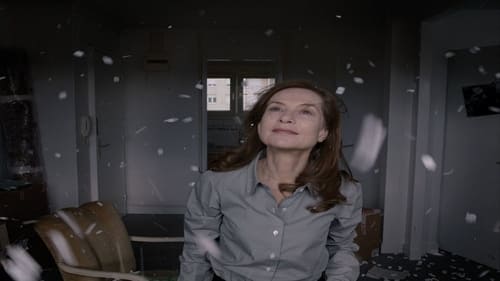
The Mechanic
Heavy traffic in the summer. Bad luck for Juliet, Albert, Jaeger and Arthur who does not reach their destination. Involved in a terrible accident that will change their lives forever.

Bernard
Three girls: Susanne, Annie and Catherine, just have finished high school and meet every night to have a good time in discos and bars with frequently changing boyfriends. Susanne’s younger sister Betty often joins them and copies their behavior, believes everything they say. So she soon ends up with with projectionist George – although she doesn’t take the pill yet.
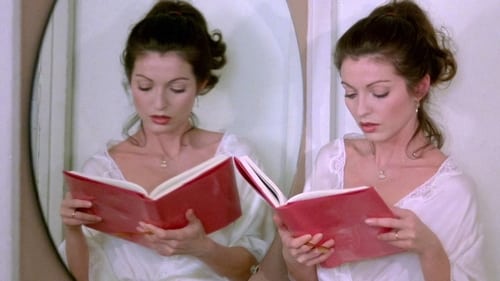
Pascal
French Postcards rings both comic and true. The believable, fresh-faced characters are young naives from American colleges spending their French-English dictionaries, they compulsively seek out hundreds of monuments, romanticize the nomadic artist's life, and look for grown-up love. The French tutor them well, as befits their reputation. Jean Rochefort is the harassed headmaster with a hankering for affairs, and Marie-France Pisier is his very sexy wife. Watch for a newcomer named Debra Winger, and another-Mandy Patinkin.
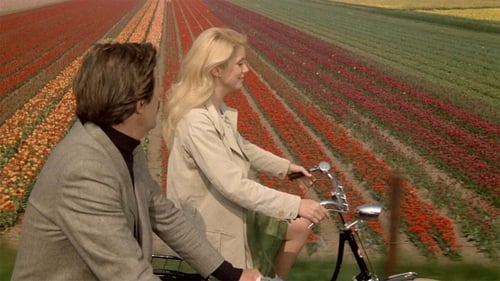
Christophe
At forty years old, Martin Belhomme leads a quiet life with his wife and two children. One day, he falls hopelessly in love with Eva, a cabaret singer. He decides to follow her to Amsterdam. From then on, his life becomes very eventful!
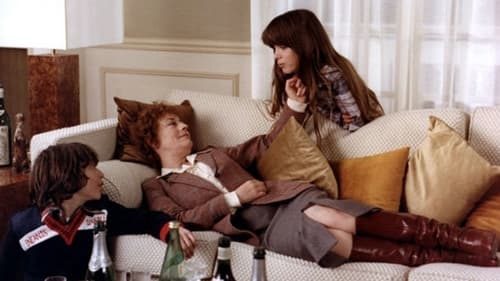
Le garçon de café
Tired of being a housewife, Annie wants to work. Between her professional life and her responsibilities as a parent, she can no longer cope. She decides to leave and starts writing a memoir of her life...
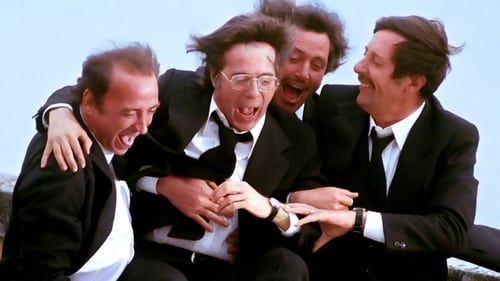
Lucien
Having fortuitously discovered a photograph in which Marthe embraces someone unknown, Étienne Dorsay becomes jealous and imagines various stratagems to identify the lover. In the meantime, he and his friends acquire a weekend house for a very low price.
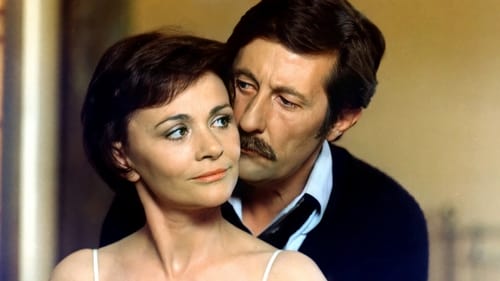
Lucien
On an otherwise normal day, Étienne, a happily married man and a good father, sees something that stops him dead in his tracks: a gorgeous woman in a billowing red dress. Long after she has left his vision, her memory continues to haunt his mind. He falls instantly in love with her and tries everything to get to know her better. Helping Étienne snare his elusive lady in red are his three bumbling buddies, which all have secret affairs and/or cheat on their wives.
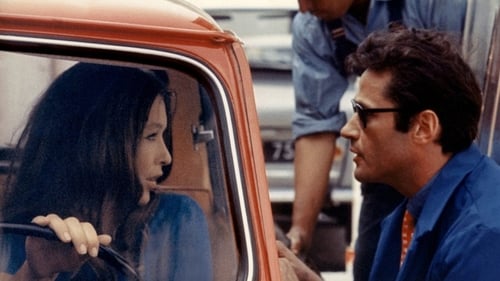
Christophe Jeanson
O "Dela" no título do filme se refere à Paris dos anos 60, um retrato da sociedade de consumo, em meio à pobreza das massas e conflitos como a Guerra do Vietnã. Um dos exemplos dessa atmosfera é Vlady, uma dona-de-casa que se divide entre cuidar da família e a prostituição, o meio mais fácil que encontra para poder ganhar dinheiro e satisfazer suas necessidades mais frívolas.
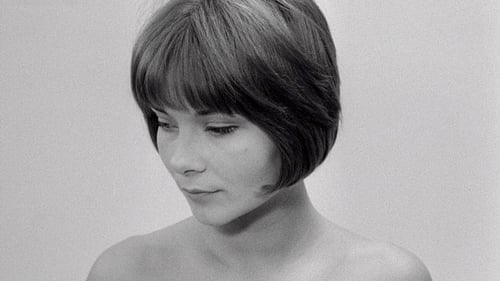
Nicolas
Vinte e quatro horas na vida de Charlotte, uma mulher casada, em Paris, onde também tem um caso. Filme de fragmentos, que são também fragmentos da vida que vemos, numa sucessão de grandes planos, seja do rosto das personagens, seja de partes do seu corpo. Tudo quase sempre emoldurado por um cenário branco, o que parece demonstrar que este é mais do que um filme sobre uma dada mulher. Pelo contrário, é uma reflexão de caráter geral, marcada por uma depuração quase total.
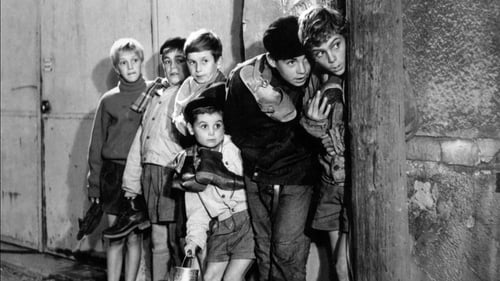
Gaston (uncredited)
Guerra dos Botões é sobre duas gangues rivais, cujos combates divertidos se transformam em violência. O título deriva dos botões que são cortados das roupas do time rival como troféus de combate

















